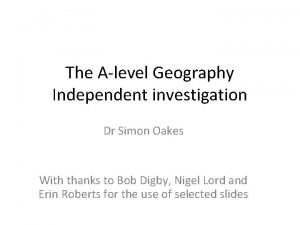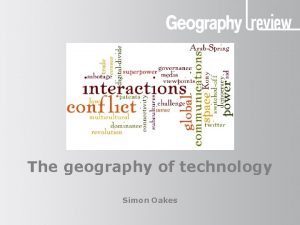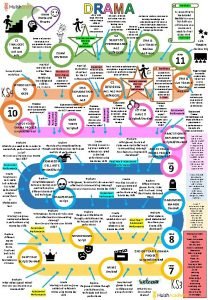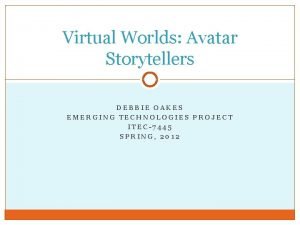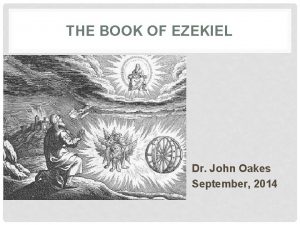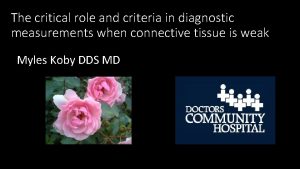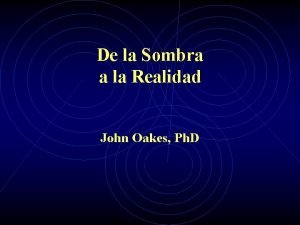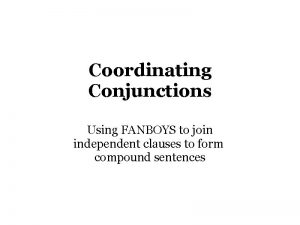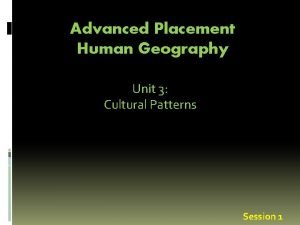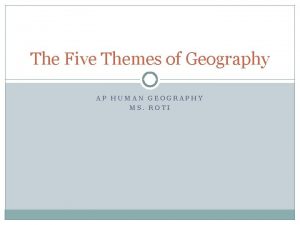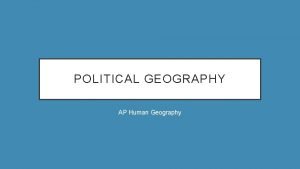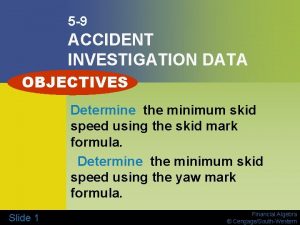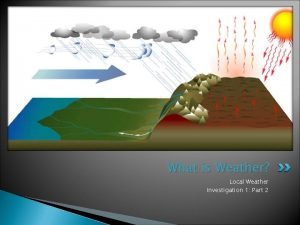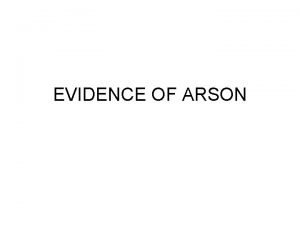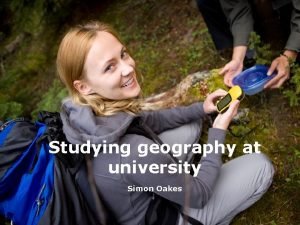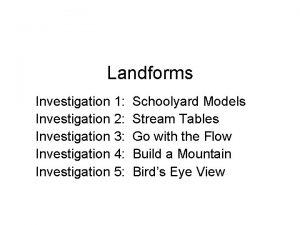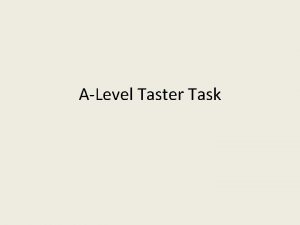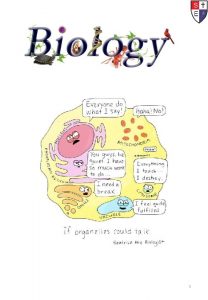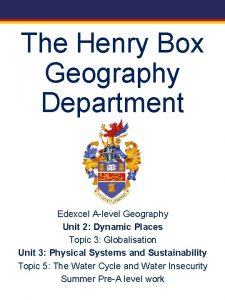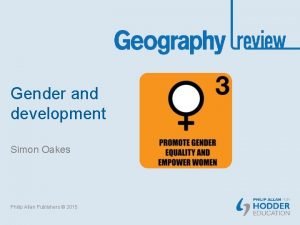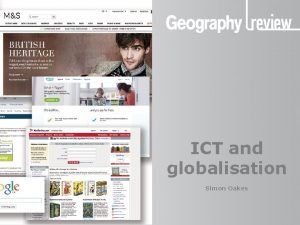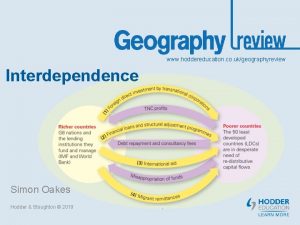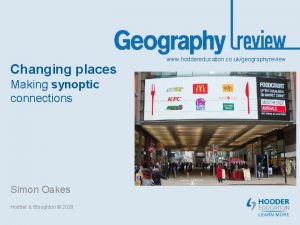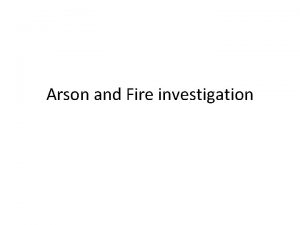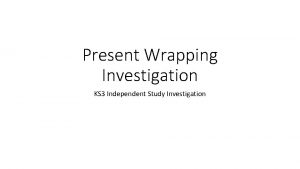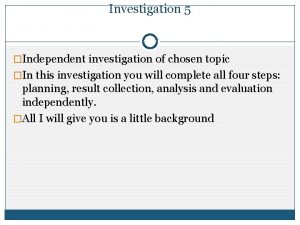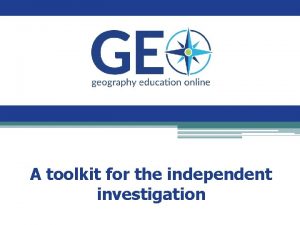The Alevel Geography Independent investigation Dr Simon Oakes





































































- Slides: 69

The A-level Geography Independent investigation Dr Simon Oakes With thanks to Bob Digby, Nigel Lord and Erin Roberts for the use of selected slides

A level Geography Fieldwork Investigation: overview • The Geography Fieldwork Investigation - also known as the Non-Examined Assessment (NEA) is an Independent Investigation, worth 20 per cent of the A-level. • It consists of a written investigation of between 3000 and 4000 words (there is no penalty for writing more). • The focus should be related to the specification – but can be part of the specification that the student has not personally studied (probably not an issue). • The investigation must include a significant element of fieldwork – potentially up to 4 days.

What questions might I have about the NEA? Should I get the pupils to do the NEA over the summer? Can I use a field studies centre? What research areas should I focus on? Can I use AS fieldwork as a basis? Questions Can all my students follow the same topic? What level of independence do I need to ensure? Can I get feedback on individual titles?

Fieldwork

Fieldwork requirements • You are free to choose how best to use the allocated time for fieldwork • Guidelines state that a minimum of two days fieldwork is to be completed at AS (relating to both physical and human geography) • At A-level, students can either build upon the knowledge and understanding of the enquiry process gained over the two days at AS, or use four days (minimum) of fieldwork to prepare exclusively for the Independent Investigation

Fieldwork at AS or A-level? ASSESSMENT • At AS fieldwork will be examined as part of an examination • 40 marks (20% of the AS qualification) will be awarded for knowledge, understanding and application of geographical skills and fieldwork techniques • At A level these skills will be examined through the independent investigation (20% of qualification)

Fieldwork planning • How might you implement field work in your own centre? • How will you meet the differing demands of AS and A Level courses? • How should you use a field study centre? The FSC have tailor-made courses for different specification

How might you implement fieldwork at Fieldwork planning ahead your centre? • Be creative – fieldwork is not just about getting on a bus and going somewhere • Put in a timetabling request early so that you have your A level students for a double period (afternoon preferable) – this makes organising fieldwork easier • Work with other local schools to plan local fieldwork experiences?

Which time of year to choose? Autumn term Summer term Advantages: • Students will be new to the course so good group bonding opportunity Advantages: • Longer day in the field and more probably better weather conditions • Fieldwork centres likely to be quieter • More time to cover the course content / concepts Disadvantages: • A shorter day in the field and a • Field centres and field study higher likelihood of poor weather locations may will be busy! • Will you have completed the topic • Possibly difficult to get students (e. g. places)? Will the students out of school, e. g. AS or mock have matured sufficiently? examinations

Basic models for the Independent Investigation Model 1 – teaching the AS Model 2 – 2 -year A level 2 days fieldwork in total including fieldwork in human and physical geography (1 day each) 1 or 2 days fieldwork in total developing skills in physical and human geography 2 days where students work independently on their Independent Investigation 2 -3 days collecting data for the Independent Investigation – students may collect data in groups A-level must include equivalent of 4 days of fieldwork. Teacher must have evidence of this, combined with their professional judgement

How to plan for AS/A level? Fieldwork process: FSC framework Insert FSC Planning fieldwork slide here

NEA basic rules

NEA enquiry process The enquiry process • The enquiry process forms a framework for application of the fieldwork and geographical skills. • • • Context and Planning Data Collection Presentation – how is the collected data presented? Analysis - and interpretation of evidence Conclusions - and how do they relate to the initial aim? Evaluation of the whole investigation – strengths, limitations, anomalies and suggestion of improvements • The aim is to build a holistic understanding of the six stages.

Department for Education requirements The independent investigation must: • be based on a question or issue defined by the student, relating to any of the core or non-core content, and bearing a title individual to that student • incorporate field data and/or evidence from field investigations • draw on the student's own research and/or secondary data • require the student to independently contextualise, analyse and draw conclusions • involve presentation of data and findings, and extended writing Department for Education, 2014

#1 question: independent or group fieldwork? • The four days’ fieldwork completed as part of the course will enable students to develop skills that they can use in their Independent Investigation. • Students may use data collected in their four days’ fieldwork as part of their Independent Investigation provided certain criteria are met and evidenced. • It is also possible to carry out the Independent Investigation on a completely separate topic with new data collected. • Or to make a comparison of places.

Procedures and paperwork • Candidates’ investigations must be internally assessed annotated to show marks have been awarded • If applicable, internal standardisation should take place (small centres might collaborate) • Marks should be submitted online at a date specified by the exam board • Boards will have clear submission procedures for samples, Independent Investigation forms, authentication section, proposal section and mark grids etc. Make sure you know about this.

What does ‘independent’ mean? • • ‘Independent’ in the context of fieldwork does not mean working alone. Students can design a methodology and collect data in groups However, they must work independently to contextualize, analyse and report their findings to produce an Independent Investigation with an individual title Teachers must check titles to ensure that students can access the assessment criteria Students can work at their own pace

Independence? From Controlled Assessment. . . Source: Bob Digby / Margaret Roberts (2015)

. . . to truly independent enquiry Enquiry is driven by curiosity and questions which link with curriculum issues or processes Enquiry is supported by carefully selected evidence in the form of new data and information Enquiry requires deeper geographical thinking and reasoning to help make sense of "messy" scenarios Enquiry is valued as a learning process which integrates the need for critical reflection by the student learner An independent enquiry pathway 1) Students decide enquiry questions, framed by teacher input and guidance. 2) Students are involved in key decisions about what fieldwork procedure and data sources to use. 3) After the fieldwork is completed, students analyse evidence independently and make their own decisions / reach their own conclusions. 4) Students critically review the validity of their evidence and the reliability of their data and methods.

Coach Instructor Teacher input Facilitator What’s my role? Thinking about teacher and student input 1. Exploring focus (context) 2. Developing a title / Q 3. Methodology and sampling 4. Primary data collection 5. Data / information presentation 6. Analysis, explanation and interpretation 7. Conclusion, evaluation 8. Reflection Directed Collaboration Student input Independent

Facilitator Independent Investigation Controls “Normal” expectations 7 – but 8? 5 6 Coach Teacher input 4 3 1. 2. 3. 4. 5. 6. 7. 8. Instructor 1 Directed Collaboration Student input Source – Nick Lapthorn, FSC & Geographical Association 2 Exploring focus (context) Developing a title / Q Methodology and sampling Primary data collection Data / information presentation Analysis, explanation and interpretation Conclusion, evaluation Reflection Independent

Facilitator How the NEA might work in practice 5 Coach 1. 2. 3. 4. 5. 6. 7. 8. Contextualising Developing Q/Title Method Data collection Presentation Analysis Conclusion Reflection 6 8 3 7 2 1 Instructor Teacher input 4 Directed Source – Nick Lapthorn, FSC & Geographical Association Collaboration Student input Independent

Levels of independence: a summary INVESTIGATION STAGE LEVEL OF INDEPENDENCE 1. Exploring focus Collaboration allowed 2. Title of the investigation, focus of investigation (sub-questions), purpose of investigation. Independent work 3. Devising methodology and sampling framework Collaboration allowed 4. Primary data collection Collaboration allowed 5. Secondary data collection (where relevant) Independent work 6. Data/information presentation Independent work 7. Data analysis and explanation/interpretation Independent work 8. Conclusions and evaluation Independent work

NEA allows us to demonstrate fieldwork progression Closed task Framed enquiry Independent enquiry Enquiry questions are selected by teacher but are explicit. Students decide enquiry questions, framed by teacher input. Decisions about fieldwork procedure are made by teachers. Data are presented as authoritative evidence. Decisions about fieldwork procedure are made largely by teachers. Data are presented as information to be interpreted. Students are involved in key decisions about fieldwork procedure and data sources. Making sense Activities devised by teacher to achieve predetermined objectives. Students follow instructions. Methods of representation are open to discussion and choice. Analysis is independent. Students independently analyse evidence and make decisions / reach conclusions. Reflection Predictable outcomes. Weakest examples Students discuss what they The best examples have learnt; different from Controlled outcomes. Students consider the What A level validity of evidence / students must aim for, reliability of data and from 2016 methods. Question A task is presented. Questions are not explicit. Data from Controlled Assessment

Developing independence: moving from AS to GCE …in preparation for… Collaboration Individual Students Individual Content Exploratory Content Small Group Whole Class Teacher-led? GCE NEA Increased student ownership of enquiry – Planning, Questions, Justification + Methods. Feeds student input into “Base” Base Content Designed to meet requirements of Fieldwork Questions + provide core content of investigation Advanced AS Basic AS: progressing from GCSE

Some FAQs Statement Yes I am No I am allowed not Can I make a resources booklet for my students to use which includes model answers and templates? Can I advise my students about health and safety considerations and ethical concerns? Can I check my students’ titles and tell them whether or not it is likely to meet the assessment criteria?

Independence • Can I make a resources booklet for my students to use which includes model answers and templates? • ✖ NO • No, this is not allowed. You can explain the requirements for the task and explain the assessment criteria and structure, but you cannot provide templates, writing frames, already completed data sets as a substitute for data collection, risk and ethical assessments.

Independence • Can I advise my students about health and safety considerations and ethical concerns? • ✔ YES • Yes, this is fine. You can and should advise on health and safety considerations, using equipment and potential ethical concerns.

Independence • Can I check my student’s titles and tell them whether or not it is likely to meet the assessment criteria? • ✔ YES • Yes, in fact this is something that you must do. You can also offer general guidance on any amendments which are needed to the title.

Independence • Can I encourage students to collaborate to plan methodologies and sampling strategies? • ✔ YES

Independence • Am I able to mark the first draft of my students’ independent investigation and give specific and individual guidance? • ✖ NO • You can give guidance at the planning stage on the methodology and analytical tools that the student plans to use, but guidance must remain generic.

Independence • Can I provide students with a theme or a list of themes for them to choose for their independent investigation? • ✔ YES • Yes, you can select the fieldwork location and provide students with one or more themes for them to choose from.

Independence • Students can work in small groups to collect primary fieldwork data for their independent investigations. • ✔ YES • Yes, students can collect data individually but they can also collect data in small groups. Some techniques are impossible to carry out unless students are working in groups (e. g. beach transect!) and there is also the health and safety aspect to consider.

Independence • Students can work in small groups to collect secondary data for their independent investigations. • ✖ NO • This is not allowed. Secondary data may not be necessarily relevant to the independent investigation. However, if it is, then data collection must be carried out completely independently. Students must select secondary sources of data on their own and cannot use resources given to them by other people.

Independence • Can I create a list of 10 or more titles for students so that they can select their individual titles from this list? • ✖ NO • No, you are not allowed to do this. You can select a theme or themes for the students to investigate but you cannot create a list of titles (however long!) for them to select their title from.

Independence • Can I allow students to take their work home with them to work on? • ✔ YES • Yes, students can take their work home with them to work on. However, you must make it clear to students that any evidence of parents or siblings helping them will be regarded as malpractice.

Independence • Can I give students as long as I like for them to complete their independent investigation? • ✔ YES • Yes, (in theory). Students are encouraged to work at their own pace and so may take varying amounts of time. However, bear in mind that this is worth 20% of the qualification and you have the rest of the course to get through.

Independence • Students can work in small groups to present, interpret and draw conclusions from their data. • ✖ NO • This is not allowed. Students must work completely independently on the presentation and interpretation of their data. They must also work completely independently to draw conclusions from their data and to evaluate their investigation.

Independence • Can I let students share resources with each other? • ✔ YES • Yes, students can share resources but these must be treated individually by each student and students must not copy each other’s work in any way.

Independence • Can I allow students in my class to have exactly the same titles? • ✔ YES • Yes, but you need to make sure that students have devised their hypothesis, questions and sub-questions independently but students may have the same or similar titles.

Is my candidate's title fit for purpose? • There is a long list of possible titles provided by each of the boards in their support materials: these provide an idea of the kind of titles that might work. • Should you wish to have any title commented upon further – perhaps ask your GCE Subject Officer if they are prepared to comment.

Topic

Choosing an NEA topic focus or frame

Core and option topic areas • • Glaciers Coasts Water Carbon • Places • Rebranding • Migration • Hazards • Climate • Ecosystems Physical core Physical options? Human core Human options? • Urban • Population • Oceans

Topic areas Water and carbon cycles Carbon cycling at different scales Local water stores and pathways Land use changes and physical systems Landscape systems Physical processes, energy flows and geomorphological features Characteristics of landforms and landscapes Landscape system management Changing Places Relationships and connections between different places Inequality and differences between and/or within places Meanings, representations and ways of managing places Global Flows of international migrants and the issues and impacts systems and Impacts of globalisation on places, and local reactions against global flows governance How global governance influences management of local areas

Developing questions and themes How far has the coastline changed over time? How resilient is it to any changes in the system? What impacts might climate change and sea level rise bring? How vulnerable is the coast to a threshold event? How well is the coast managed? How far will costs of future management be worth the benefits? How much do physical processes in the coastal zone influence coastal management here? How beneficial are the impacts from …. (tourism or coastal management)? How does the sediment cycle operate along this stretch of coast? What implications does this have on… ‘coastal management’ / ‘land forms’ / ‘integrated coastal zone management’?

Questions to ask • Is the work geographical and linked in a clear and meaningful way to a content area contained within your Geography Specification? • Is any planned survey work manageable and achievable in terms of its scale, location and accessibility? • How much time and equipment will be needed? • Does your initial background research into the topic indicate whether any high-quality supporting data and information have been published previously? • Does the focus you have chosen link with any other geographical topics, issues or concepts so that it can be framed usefully within a “bigger picture”?

Moving from a focus/question to a title A good title might be. . • … not based on a simplistic model (e. g. Bradshaw) • … something which draws on the student's own interest, research, including their own field data and, if relevant, secondary data sourced by the student. • … evaluative, involving an assessment of something (e. g. ‘how far does …. ? ’) • . . capable of being answered (even if only tentatively) using a range of data which are appropriate for this age group and can be collected in four days

What title? Aim A statement of what your geographical enquiry wants to achieve. A well-thought out enquiry aim will be geographically sound achievable. “An investigation into the effectiveness of traffic calming measures in Leeds. ” “An investigation into the reliability and variability of regional weather forecasts when compared with local primary data in Wimbledon. ” Question Key research question(s) are used to frame the enquiry. One question may serve as the overall enquiry title, while additional questions are used to help sub-divide the written report. “How and why do beach profiles vary along a short stretch of coastline? ” “To what extent are golf courses an environmental, economic and social asset in Wiltshire? ” Hypothesis A hypothesis is a statement whose accuracy can be tested objectively using scientific methodology. You may also be familiar with the use of null hypotheses in science lessons. “Most shoppers in Southport purchase goods and services at least once a week. ” “There is no significant difference between the gradient of shingle beaches and sand beaches in Lancashire. ”

Investigating glacial systems Aim Questions Hypotheses To investigate the influence of aspect on the morphometry of cirques in [study area] How does cirque morphometry (e. g. width, length, height of back wall etc. ) vary with aspect? Cirques on slopes orientated towards the NE are larger and more deeply incised (i. e. they have a higher backwall). Has geology and local structure exerted an influence on cirque morphometry? What different types of sediment are evident in the exposed sequence? Cirques oriented parallel to local faults are larger and more deeply incised. The site was influenced by multiple phases of glaciation. The ice flow affecting the area was from the [add direction]. The tills present were formed by subglacial deposition. Example: To investigate the influence of aspect on the morphometry of cirques in Snowdonia. To investigate the past glacial environments at [study site] through an analysis of glacial sediments. Example: To reconstruct the past glacial environments at Glanllynnau, North Wales through an analysis of the glacial sediments exposed in the coastal cliffs. How many phases of glaciation can be identified through tills analysis? What do the tills indicate about ice flow directions and sediment pathways?

Investigating global systems • Survey of a clone town: CBD exposure to global investment and trade flows • Survey of citizens’ use of online purchasing and participation in global trade flows • Survey of how diaspora communities use social networks to maintain contact with families • Survey of ethnic food outlets and restaurants as proxies for post-colonial migration flows (may include interviews) • Survey of social attitudes towards sovereignty and Brexit (may include Chi-squared analysis for different sub-sets of population) • Survey of global food sourcing for a sample of supermarkets and small businesses (‘Fish Fight’ campaign links) AIM QUESTION HYPOTHESIS Any ideas?

Using concepts Concept Definition Resilience The capacity of a system to experience shocks, while retaining essentially the same function, structure, feedbacks and identity Examples of individual investigation opportunities Flood risk and community resilience Economy of a town - its resilience against economic recession Ecosystem resilience Systems thinking is the process of understanding how connected things (parts) influence one another within a complete entity or larger network Inputs, outputs and stores within a local hydrological sub-catchment Economy of an urban system Understanding carbon flows in a woodland ecosystem Place identity describes the real or perceived qualities which makes somewhere appear to people; it affects how we connect with various neighbourhoods and locales. It is also about belonging, meaning and attachment to places at a very personalised level Place identity as perceived by tourists The identity of rural places and the identity of urban places Connections to place for people of different ages or cultures

Anticipating assessment Level 4 19 -24 marks (24 is the maximum mark available) Synthesises research findings coherently and comprehensively. Provides a balanced appraisal of the reliability of evidence and validity of conclusions. A balanced and concise, well-developed argument is expressed through sustained logical lines of reasoning that demonstrates use of a structured and comprehensive enquiry process. Uses accurate geographical terminology throughout. Convincing conclusions that are fully supported by drawing together a selection of relevant evidence and concepts linked to the entire purpose of the investigation. Selected marking criteria for the ‘conclusions and critical evaluation’ element of NEA Source: Edexcel

Using secondary and ‘deskwork’ sources • GIS landscape sampling and analysis • Data sets and reports from specialist organisations (e. g. ONS data, Mayor’s Office London) • Contemporary articles from journals • Textbooks (beyond the usual course textbooks) • Appropriate theory • Digital data sources and social media

A good source of data to begin to ask questions Source: Oliver Obrien / ONS data. Life. mappinglondon. co. uk “Big data” may become an important part of the investigation

Using new technologies Using GIS from expert websites e. g. ONS

Using new technologies

Primary data: quantitative or qualitative? Qualitative methods include • interviews (structured, semi-structured, open-ended / ethnographic) – which can be face-to-face, by phone, text messaging or online e. g. Skype / Facetime • Interpretations of images (photos, advertising, paintings), paintings, music, film, text and other media e. g. in place identity and representation – by oneself or by others

‘We’re living in the future’

Changing places Connections Content PLACE MEANING AND REPRESENTATIONS Understandings Identity (perspectives) Contrasts Agency (conflict) (players/power)

Students should develop the following with respect to qualitative data: • use and understanding of a mixture of methodological approaches, including interviews • interpretation and evaluation of a range of source material including textual and visual sources • understanding of the opportunities and limitations of qualitative techniques such as coding and • sampling, and appreciation of how they actively create particular geographical representations • understanding of the ethical and socio-political implications of collecting, studying and representing geographical data about human communities.

Changing places – qualitative A-level geography High house prices Proximity to nature Traffic congestion Sense of community Urban crime Poor air quality Overcrowded schools Noise pollution Sense of history Empty roads Quiet and tranquil Pictureque cottages Possible reasons to leave the city Drab, ugly buildings Lack of green spaces and views Protests and demonstrations Less crowded schools Possible reasons to move to the coun Affordable housing Social order Are these factors objective and quantifiable? Or are they subjective interpretations of places? How might place bias be linked with demography?

Changing places • Utopian or dystopian view of urban and rural living? • Different ages, different perspectives (the family life cycle)

Changing places – qualitative A-level geography

Changing places – qualitative data

Changing places – qualitative data AATB Isle of Arran Distillery Arran Aromatics Arran. online Arran. uk. com Authorship Official Commercial Informal Mentions Ayrshire Yes Brodick Castle Yes Yes Lochranza Distillery Yes Auchrannie complex Yes Local retailers Yes Yes Arts and crafts Yes Yes Music Geology History & archaeology Yes Yes Yes Truth claims Feedback Opportunities Guarantees of authenticity Site invites reader to join mailing list Email guest book provided Feedback is invited on site quality Email address, but no name Email address, uses designer’s name Professional graphics; animation High quality graphics Amateur graphics Natural language Impersonal, Formal, commercial orientation commercialorientati on Professional graphics & Professional graphics typography Formal but friendly Personal, friendly tone

In summary • The Independent Investigation represents a big change in GCE Geography for teachers and learners • It strengthens the role of fieldwork in the curriculum – with trickle-down implications for GCSE and KS 3 • It provides an opportunity for a new role of teachers as tutors in schools and colleges – dialogue about learning • Prepares students for work and/or HE, and promotes genuine independence

Where can I go for more information? • A Joint Board Committee is currently writing a series of common questions and answers, which will be published in the near future • JCQ Exams Office also provide some helpful information and support. • http: //www. jcq. org. uk/exams-office/non-examinationassessments

Summer 2017
 Dr simon oakes
Dr simon oakes Simon oakes geography
Simon oakes geography Saira has a fear of cats
Saira has a fear of cats Edexcel alevel history
Edexcel alevel history Aqa data sheet
Aqa data sheet Drama alevel
Drama alevel Debbie oakes
Debbie oakes Oholibah
Oholibah Grabb oakes measurement
Grabb oakes measurement Janna oakes
Janna oakes John oakes phd
John oakes phd The history and archaeology of the bible
The history and archaeology of the bible Jesus real
Jesus real John oaks
John oaks John oakes
John oakes Independent investigation meaning
Independent investigation meaning Two main clauses
Two main clauses Environmental perception definition ap human geography
Environmental perception definition ap human geography Ap human geography frq format
Ap human geography frq format 5 themes of geography ap human geography
5 themes of geography ap human geography Proruption ap human geography
Proruption ap human geography Diễn thế sinh thái là
Diễn thế sinh thái là Vẽ hình chiếu vuông góc của vật thể sau
Vẽ hình chiếu vuông góc của vật thể sau Phép trừ bù
Phép trừ bù Tỉ lệ cơ thể trẻ em
Tỉ lệ cơ thể trẻ em Lời thề hippocrates
Lời thề hippocrates đại từ thay thế
đại từ thay thế Quá trình desamine hóa có thể tạo ra
Quá trình desamine hóa có thể tạo ra Cong thức tính động năng
Cong thức tính động năng Các môn thể thao bắt đầu bằng tiếng chạy
Các môn thể thao bắt đầu bằng tiếng chạy Sự nuôi và dạy con của hổ
Sự nuôi và dạy con của hổ Thế nào là mạng điện lắp đặt kiểu nổi
Thế nào là mạng điện lắp đặt kiểu nổi Hát kết hợp bộ gõ cơ thể
Hát kết hợp bộ gõ cơ thể Các loại đột biến cấu trúc nhiễm sắc thể
Các loại đột biến cấu trúc nhiễm sắc thể Vẽ hình chiếu đứng bằng cạnh của vật thể
Vẽ hình chiếu đứng bằng cạnh của vật thể Nguyên nhân của sự mỏi cơ sinh 8
Nguyên nhân của sự mỏi cơ sinh 8 Phản ứng thế ankan
Phản ứng thế ankan Voi kéo gỗ như thế nào
Voi kéo gỗ như thế nào Thiếu nhi thế giới liên hoan
Thiếu nhi thế giới liên hoan điện thế nghỉ
điện thế nghỉ Một số thể thơ truyền thống
Một số thể thơ truyền thống Thế nào là hệ số cao nhất
Thế nào là hệ số cao nhất Trời xanh đây là của chúng ta thể thơ
Trời xanh đây là của chúng ta thể thơ Ng-html
Ng-html Số nguyên tố là
Số nguyên tố là Tia chieu sa te
Tia chieu sa te đặc điểm cơ thể của người tối cổ
đặc điểm cơ thể của người tối cổ Các châu lục và đại dương trên thế giới
Các châu lục và đại dương trên thế giới Tư thế worm breton là gì
Tư thế worm breton là gì Sơ đồ cơ thể người
Sơ đồ cơ thể người ưu thế lai là gì
ưu thế lai là gì Tư thế ngồi viết
Tư thế ngồi viết Cái miệng nó xinh thế chỉ nói điều hay thôi
Cái miệng nó xinh thế chỉ nói điều hay thôi Cách giải mật thư tọa độ
Cách giải mật thư tọa độ Bổ thể
Bổ thể Tư thế ngồi viết
Tư thế ngồi viết Giọng cùng tên là
Giọng cùng tên là Thẻ vin
Thẻ vin Thơ thất ngôn tứ tuyệt đường luật
Thơ thất ngôn tứ tuyệt đường luật Các châu lục và đại dương trên thế giới
Các châu lục và đại dương trên thế giới Chúa yêu trần thế alleluia
Chúa yêu trần thế alleluia Hươu thường đẻ mỗi lứa mấy con
Hươu thường đẻ mỗi lứa mấy con Từ ngữ thể hiện lòng nhân hậu
Từ ngữ thể hiện lòng nhân hậu Lockdown ive
Lockdown ive 5-9 accident investigation data answers
5-9 accident investigation data answers Multiplication investigation
Multiplication investigation Weather investigation
Weather investigation Lesson 8-2 special right triangles
Lesson 8-2 special right triangles Surface area investigation
Surface area investigation Arson evidence collection and analysis
Arson evidence collection and analysis
